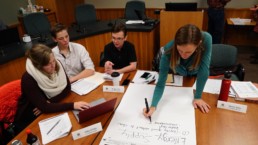Bend Community Climate Action Planning Initiative
Year Complete: 2020
Grant Amount: $50,000
Local Government: City of Bend, OR
Local Foundation: The Oregon Community Foundation
Project Purpose
To engage diverse voices to co-create and implement a community climate action plan with innovative strategies that balance equity, efficiency, economic development and meaningful climate benefits.
Key Lessons Learned
Lessons learned about tools and tactics through the project that other sustainability directors could use to advance their work.
- To successfully serve marginalized communities, you must spend time, resources, and bandwidth well before your planning effort. It will require organization-wide coordination with honest and long-term commitment.
When work began, the project team did not have established relationships with underserved communities or organizations. Building trust and relationship with these community members was a priority because the willingness to engage in the planning effort was influenced by past relationships with government. The project team used the planning process to establish new relationships, grow existing ones, and foster long term engagement through the grant work.
- Policy approaches for politically divided communities.
The project team learned that recommending more aggressive policies in politically divided communities requires a careful approach. In these communities, it was more successful to use the climate action plan to create pathways that left open options for achieving the goal through either voluntary or mandatory programs and not be too prescriptive to create buy-in.
Lessons for developing collaborative relationships between a local government
sustainability director and a local place-based foundation
Keeping up with evolving donor goals and values is imperative to sustaining continued funding. Through communication with foundation, city staff better understood local donor interest areas. Evolving donor goals help government agencies to advance work quickly and avoid getting stuck in perpetual planning. Aligning opportunities amidst the different paces of government work and donor attitudes is important.

